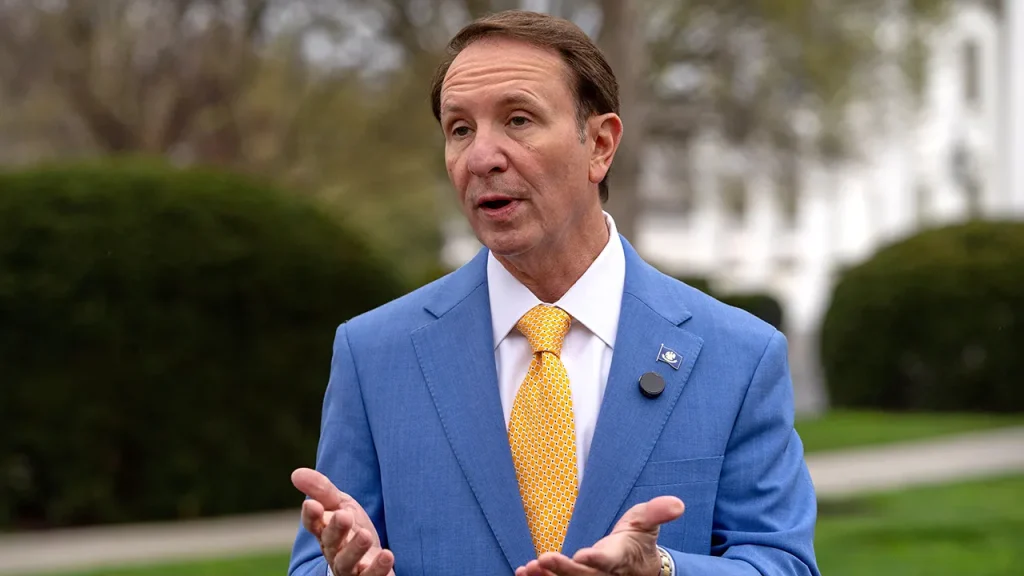LSU’s Coaching Crisis: Landry Strips Athletic Director’s Power in Search for Kelly’s Replacement
In a dramatic power shift, Louisiana Governor Jeff Landry has publicly declared that LSU Athletic Director Scott Woodward will have no role in selecting the university’s next head football coach. The announcement came Wednesday during a press conference addressing the sudden departure of Brian Kelly, who spent less than four seasons in Baton Rouge. “No. I can tell you right now, Scott Woodward is not selecting the next coach,” Landry stated emphatically, adding, “I’ll let President Donald Trump select him before I let him do it.” This unusual intervention by the state’s highest political office signals serious concerns about leadership within one of college football’s most storied programs.
The termination of Kelly’s tenure has left LSU with a staggering $54 million buyout obligation, a financial burden that clearly factored into the governor’s decision to intervene. Landry specifically referenced Woodward’s track record with expensive coaching contracts, noting, “The guy that’s here now that wrote that contract cost Texas A&M $77 million,” referring to Jimbo Fisher’s massive buyout that Woodward had previously negotiated. This follows a pattern of costly separations under Woodward’s leadership, including the $17 million buyout for Ed Orgeron following his 2021 dismissal. While reports suggest private donors might cover some of Kelly’s buyout, and the amount could be reduced if Kelly secures another coaching position, the financial implications remain significant for the university.
Governor Landry outlined a new approach for selecting Kelly’s replacement, announcing, “The Board of Supervisors are going to come up with a committee, and they’re going to find us a coach.” This unusual structure effectively removes the athletic department from what is traditionally its central responsibility. The governor-appointed board members will now direct the coaching search, representing a fundamental shift in how athletic decisions are made at the university. When Fox News Digital contacted the LSU athletic department for comment, they received no immediate response, perhaps indicating the unexpected nature of this administrative overhaul.
The governor made it clear that while LSU will continue to pursue top coaching talent with appropriate compensation, any new agreement will include performance metrics and accountability measures. “I’m tired of rewarding failure in this country,” Landry stated, suggesting that Kelly’s contract represented precisely the kind of unconditioned reward system he opposes. This philosophy marks a significant departure from recent collegiate coaching contracts, which have typically offered substantial guaranteed money regardless of on-field results. Landry characterized his involvement as focused on “the fiscal effect of firing a coach under a terrible contract,” emphasizing his concern for “what the taxpayers are going to be on the hook for.”
Kelly’s departure comes after what many consider an underwhelming tenure at LSU, despite the university’s significant financial investment in his leadership and in transfer portal players. Woodward had announced Kelly’s removal on Sunday following LSU’s 49-25 loss to Texas A&M, acknowledging that “the success at the level that LSU demands simply did not materialize.” Kelly had arrived with considerable fanfare after leaving Notre Dame in 2021, with expectations of competing for Southeastern Conference and national championships. Instead, his abbreviated tenure ended with Woodward making the decision “to make a change after last night’s game,” a move that the governor has now revealed involved his input as well.
As LSU enters a bye week before facing Alabama on November 8, the university finds itself at a crossroads. The Tigers must navigate not only the immediate challenge of selecting a new football leader but also adapting to a fundamentally altered power structure within the athletic department. The governor’s unprecedented intervention represents a rare collision between state politics and collegiate athletics, with significant implications for how major universities manage their sports programs and their finances. For LSU fans and the broader college football community, this situation highlights the evolving landscape of collegiate athletics, where financial considerations and political oversight increasingly influence decisions traditionally left to athletic administrators.


